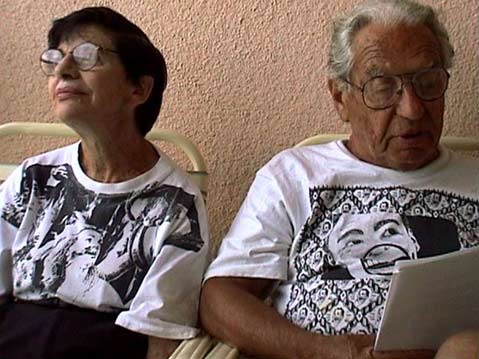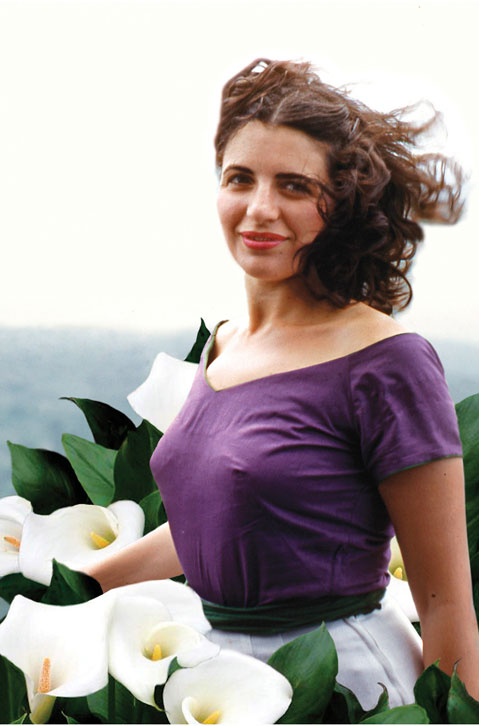Tainted Love
Filmmaker Cindy Kleine Discusses Phyllis and Harold, a Portrait of Her Parent's Messed Up Marriage

In 1995, filmmaker Cindy Kleine decided to videotape interviews with her mom and dad. Though each were asked the same exact questions, Kleine was immediately fascinated by her parents’ remarkably different recollections. She also used the setup to explore the details of a dark family secret: her mother’s affair, which started in the early days of the marriage and was rekindled decades later. Over the next 12 years — through her father’s 2003 death and her mother’s passing in 2006 — Kleine kept the cameras rolling, and the result is the deeply personal documentary Phyllis and Harold, which screens on January 19 at UCSB’s Campbell Hall. Kleine, who will be at the screening, spent some time last week discussing her work from her home in New York City. What follows is an edited version of that conversation.
Did you father ever find out about the affair?
Not in any way that I know about. In other words, if he knew about it early on, he knew about it in that way people know about things but don’t want to know about things. Later on, though, he definitely didn’t know.
Did finding out about it change your impression of them?
I was 18 when I found out. It changed because I was newly in love for the first time, and it changed my whole outlook on that subject. The reaction I remember having was disbelief. I couldn’t understand how someone could be in love with someone and not end up with them. I had a naïve 18-year-old point of view. But it also explained why my parents had always been fighting in my childhood, and it made sense. No wonder they don’t seem to be the perfect couple. It also raised all these questions about love and what does that mean. Just because you’re in love with someone doesn’t mean that you can be with them. At that age, you believe of course you can be. It was very confusing. In retrospect, at that age to find out that story was clarifying in one sense and very confusing in another sense.
You’ve said that you think their story is in some ways universal.
Yes, in the way that all of us see our own lives and our own relationships through our own lens. Each of us has our own personal mythology. I was going to make another film with more couples, but I realized in interviewing both siblings and couples of all kinds that everyone has the same thing: If you ask anyone about their childhood and you ask a sibling, they’ll tell you two completely different stories almost all of the time. It became apparent that our memory and our history is just our own fiction. We create and change it as we go along. That’s what fascinated me. There is no objective truth about anything in human relationships. It’s even based on the mood at the time of the telling. In that sense, I think the film is completely universal. Also, many, many, many people come up to me after a screening, particularly of that generation, and see their own story in it or their own parents’ story in it. Typically, they married because they had to get married by a certain age.
Do you think it happens these days too?
I would guess it probably does. The difference is that people don’t feel the pressure to get married at 20 or 21. Often, they wait long enough to get to know and live with someone. You glean a lot of information in that sense. The irony is that marriages don’t last as long as they used to.
Do you have children?
No. I have two cats, they are my surrogate children.
Was your parents’ relationship a reason why you didn’t have children?
I would certainly say that had something to do with it. I didn’t have a very good role model for parenting. And I honestly didn’t think as an artist that I had — well, I feel very strongly that in order to be a good parent, you have to really put your children first. I didn’t think I would have the patience or the wisdom for it.
Toward the end of her life, your mom seems to be genuinely focused on your dad.

I was fascinated by that. For me, that was a big lesson and hopefully it comes across in the film. It really showed me that our life is this very short period in the big picture and we spend so much time worrying and obsessing about and focusing on certain things, like how she’d be fantasizing about the other man. Then in the end, it was almost like she forgot about it, like it meant nothing to her. What really mattered was the real life she had. There was something educational about that for me, a lesson in what not to waste time worrying about because, in the end, what we think are major problems and issues and obstacles really don’t matter that much. The other lesson is not appreciating what you have. It felt like such a shame she was able to appreciate all these things about my dad and the life he had given her at the end of her life, but she didn’t seem to appreciate him at all, not for five minutes, when he was alive.
Did you have reservations about revealing a family secret on the big screen?
I was terrified to show it for the first time. I was just a wreck. My work has always been something like that, always very personal and revealing. It must be something in my background. Due to the family I grew up in, it’s always very important to me to tell the truth that other people try to hide, to really bring out into the open the shadow side of things and the side of things that become secrets. I tend to think it’s really unhealthy in families and relationships to keep secrets, and that secrets fester and grow into larger obstacles. In families, they get passed down generations. That’s very unhealthy. One interesting thing about my film is that many people come up to me after seeing it and feel free to talk about huge secrets in their own families that they would never have dared talk about before. But I guess that’s always been an important part of my work: to reveal the dark side of things, but with humor. Without the humor, it would be unbearable.
Did you ever send a copy to your mother’s lover?
He was an old man by the time the film was finished, and he’s dead now. I thought about it, but I felt uncomfortable. I just didn’t know if he’d want to see it. He was in his 90s, so it felt like it was too weird to lay it on him. Also, it might make him nervous, even though his identity is not revealed.
How did you family react to the film?
I was very worried about my sister. She was in it, but I never showed her a rough cut. She does feel self-conscious about it, and feels like people will judge her badly, but she actually loves the film. That was a big relief to me. I have a very small family. My father’s brother and his wife, and their children, my cousins, they saw it and loved it. My uncle’s response was that he didn’t know the full story, but he knew something like that had gone on. He wasn’t at all surprised.
4•1•1
Cindy Kleine will be on hand to show Phyllis and Harold at UCSB’s Campbell Hall on Wednesday, January 19, 7:30 p.m. Call 805-893-3535 for tickets. See phyllisandharold.com for more info.



